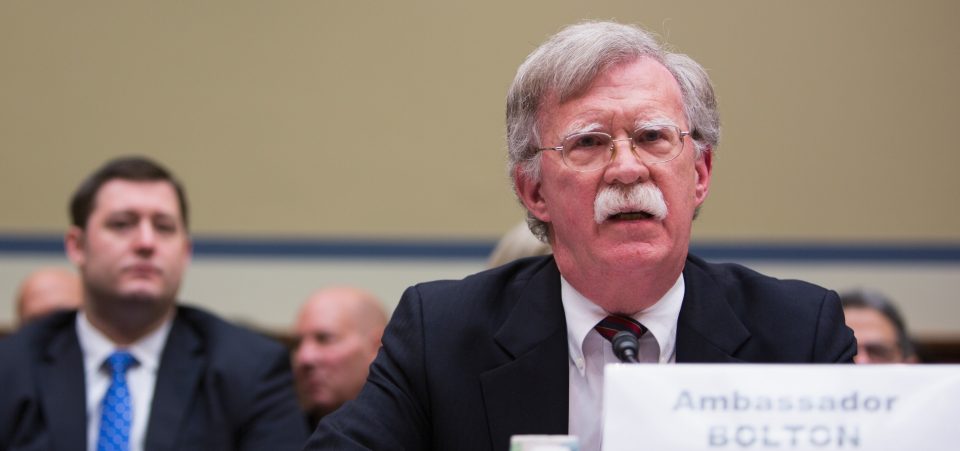World War III Approaches as Trump Replaces McMaster with Hawk John Bolton
With the appointment of a veritable dream team (or nightmare ensemble, if you prefer) of hawks to key national security posts, should we expect more wars of choice in the next few years, or even months? John Bolton, whom some have described as”‘a man with a hammer, who sees everything as a nail,” has replaced General Herbert Raymond McMaster as Head of National Security.
Bolton’s nomination may not quite mean World War III all by itself. However, Bolton as National Security Advisor would see him join Mike Pompeo at the State Department and Gina Haspel, known for her enthusiastic support of torture, as CIA Director (if confirmed). That leaves James “Mad Dog” Mattis as the last adult in the room. Somehow, when that proverbial last adult answers to “Mad Dog,” it doesn’t inspire confidence in his colleagues.
This is more a mixed martial arts arena than a cabinet—or maybe it’s more of a bullpen for rabid dogs. In fact, Mattis’ tenure will come under scrutiny, given he and the ousted Rex Tillerson agreed on all major policy points. President Donald Trump can’t fire Mattis easily because of the retired general’s military reputation; the president’s voters would not approve. But there’s always the good, old-fashioned “quitting” ploy.
That might work, and the likes of a Bolton and Pompeo would have no obstacles to finding “nails” in the global arena that need a good hammering. World War III could be this warmongering carpenter’s magnum opus.
John Bolton has strongly encouraged military intervention against Iran, just as he did against Saddam Hussein’s Iraq. He has also called for the United States to attack and bomb Syria and North Korea, among others. Doing any of those things would trigger immediate crises of the kinds that trigger global wars. Russia would consider any U.S. attack against any of those countries as a major affront, given they are allies (Syria, Iran) and/or neighbors (North Korea).
And China would not remain a mere observer. President Trump has already unleashed a trade war against Beijing, Bolton has doubled down, and China has already hinted at how it might respond. (Source: “John Bolton Calls China Tariffs ‘Shock Therapy,’” The New York Post, March 25, 2018.)
The Neoconservatives Take Over Trump’s White House
They never really left, yet Bolton’s appointment means signals that the neoconservatives—who are like neoliberals in economic matters, but more aggressive in foreign policy and military affairs—are back in the command seat. And unless they’ve gone into therapy to treat their penchant for aggression, Americans and the world (some countries will experience it more directly than others) can expect a renewed “commitment” to all-out military intervention to fulfill unspecified American interests.
Trump has surrounded himself with the very advice he criticized during the campaign. It’s the idea that the U.S. has a moral duty to overthrow hostile dictatorships, replacing them with Western-style democracies.
The only evidence from such experiments (which the neoconservative ideologues don’t even have the modesty to describe as such) that is unproven theories has been the loss of human lives and property. It has also meant the waste of many dollars, which taxpayers could have “wasted” better themselves, rather than having armchair generals in Washington use them to play Napoleon and a real-life version of the board game “Risk.”
Armchair Generals with No Skin in the Game
Indeed, ultimately it all comes down to a discussion of risk, or “skin in the game,” as noted options trader and author Nicholas Nassim Taleb describes in his book of the same name. The neoconservatives encouraged the war in Iraq. Then, as then-President Barack Obama started to withdraw from Iraq, as his predecessor had established, the same ideologues and interventionists—people like Bolton—cheered for U.S. engagement in the revolts of the so-called Arab Spring.
The U.S. used a well-honed but highly criticized tactic of encouraging Islamists and radicals (the so-called moderate rebels), who swelled the ranks of al-Qaeda offshoots. One such offshoot was ISIS. The neoconservatives, whom Trump had criticized in his pre-political days—he dismissed the Iraq invasion during the 2016 campaign—are now in charge of his presidency and legacy. (Source: Fox News, “Trump: All Smart People Know the Iraq War Was a Huge Mistake,” YouTube Video, 8:45, February 14, 2016.)
They take risks, but unload the responsibility for failure on others from the presidents, who approve their cockamamie schemes to (of course) the various people who suffer their effects. In Syria, that would include the Syrian people as a whole. The best part is that while you and I would have endured extreme consequences for failures on the scale as Iraq, none of the neoconservatives have suffered any penalty. Trump has just promoted them—again.
The neoconservatives will promote their goals and persuade Congress and the American people using the rhetoric of spreading democracy. It is in that sense that Bolton himself has led the cheers for a war against Iran. Not satisfied, he has identified more nails in need of a good hammering, having expressed favor for a preventive war against North Korea. Trump will probably give up thoughts of meeting Kim Jong-un face to face should Congress approve Bolton’s nomination.
Americans May Feel a Little Confused
Those who voted for Trump instead of Hillary Clinton might be a little confused. Many chose the real estate tycoon over the former Secretary of State because he was adamant about keeping the United States away from conflict. It was Clinton, as Trump reminded us during the debates leading up to the November 2016 election, who was going to start new wars.
Trump may have started out his presidency trying to maintain his promises on foreign policy, yet the many interests at play and the various lobbies found their way into his Oval Office as well. Some of the big donors to his campaign—the likes of a Sheldon Adelson, for example—wanted some return on investment. Trump delivered, agreeing to move the U.S. embassy in Israel from Tel Aviv to Jerusalem, effectively formally recognizing that city as Israel’s capital.
Bolton and the Empire Strike Back
John Bolton is not a neoconservative in the same way as a Richard Perle or Bill Kristol. Nonetheless, he has proven to be more than a willing executor of their ideas, belonging to think tanks like the American Enterprise Institute. You may know Bolton more for his rudeness or extreme frankness, yet it’s as George W. Bush’s ambassador to the UN that he distinguished himself.
Bolton was adamant about the U.S. leaving the U.N. because that would have given Washington the freedom to launch wars wherever it deemed necessary, without having to abide by pesky international agreements and legal consequences. He didn’t last very long at that post; the Democrats in 2006 blocked his renewal, forcing him to resign.
Resignations do not come with changes in outlook, and one of Bolton’s projects has always been to challenge Iran. That might be the most significant political goal he would pursue. Mike Pompeo at Foggy Bottom and Trump himself would only encourage it, scrapping the Iran nuclear deal. Bolton was one of the pioneers of accusing Tehran of pursuing a clandestine military nuclear program as early as 2003.
He urged military action then. Removing the deal that Obama signed in 2015 would essentially open the path to military action. Without a deal, the Iranians have no more reasons to allow inspections and many reasons to develop their nuclear weapon capabilities. The United States therefore would find itself under pressure to launch a direct military strike against Iran’s nuclear research facilities.
How Might the Road to World War III Play Out?
Like many “prophetic” things, Damascus is key, and the road to Tehran will likely start from Damascus. Or better, the U.S. and much of NATO have been ratcheting up the rhetoric against Syria and Russia over the so-called civil war. Further, Turkey has made the already complex situation even more so, invading Syria’s Kurdish territories.
Alternatively, the always tense relations between Israel and Hezbollah in Lebanon need little to reach the boiling point. Should Hezbollah retaliate against an Israeli attack, a full-out war with Lebanon, as happened in 2006, will erupt. However, given the nuclear deal and PM Benjamin Netanyahu’s concerns, Iran will be inevitably drawn. In turn, a foreign policy dominated by the likes of a Bolton and a Pompeo will encourage the U.S. to stumble into a war on Iran.
Meanwhile, Vladimir Putin won’t be watching. Russia has spent a few years perfecting its military policies. The overarching defense policy in Moscow has been to focus on defense, maximizing weapons’ capabilities, while keeping numbers and spending down. The concept is to make defense more efficient, effective, and affordable. Washington under Trump, on the other hand, has maximized spending. The defense budget takes up some $700.0 billion and some of his cabinet members are eager to test the validity of the saying “you get for you pay for.”
The answer, I hasten to say, is that the saying is not always right. When it comes to wars, the Russian approach might be better, as it ensures a strictly defensive posture. The U.S. military budget betrays the fact that the country still harbors not-so-veiled offensive aims. Trump’s appointment of Bolton confirms it.
The Middle East (and the diplomatic efforts against Russia, which wants to preserve Syrian sovereignty) is a powder keg. The “War on Terror” has cost trillions–some say as much as $5.6 trillion. (Source: “The Cost of War for rhe U.S. Taxpayer Since 9/11 Is Actually Three Times the Pentagon’s Estimate,” Newsweek, November 8, 2017.)
Yet it has utterly failed. Terrorism in the regions where Washington has intervened has only grown in intensity and ferocity. Bolton and Pompeo offer more of the same; that means, of course, more of the same spending. That’s great news for the military-industrial complex, but it’s not great for American taxpayers or for reigning in U.S. public debt, which risks flying out of control, given the unproven theory behind Trump’s tax cuts.
By appointing John Bolton, Trump has taken a high-risk gamble with the fate of the world. He has earned a reputation for incompetence. He was a propagandist for the war against Iraq, Iran, Syria, and North Korea. He’s a “go big or go home” kind of fella. Except ordinary Americans and others will be the ones “going home.” He cares little for the civilian population. This is the kind of incompetence that is fueled by hubris, and it could lead to World War III.






